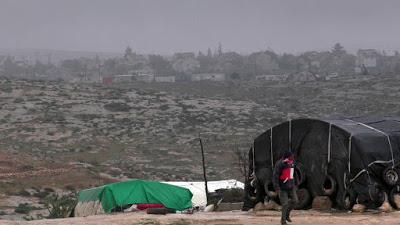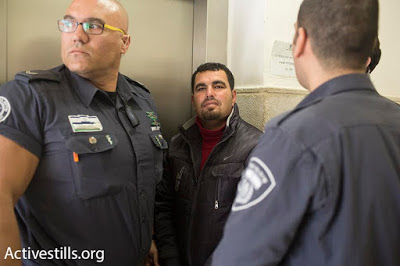Jewish Co-defendants Tried Under Different Legal
System
System
The
two Jewish co-defendants, who are alleged to have also informed the Palestinian
police about someone who fraudulently sold land to settlers, who would
therefore be subject to imprisonment, are being tried under Israeli law. In fact there was no land seller. It was all a set-up by a right-wing Zionist NGO
to entrap Jewish human rights workers who opposed the sale of Palestinian land
to Zionist settlers.
two Jewish co-defendants, who are alleged to have also informed the Palestinian
police about someone who fraudulently sold land to settlers, who would
therefore be subject to imprisonment, are being tried under Israeli law. In fact there was no land seller. It was all a set-up by a right-wing Zionist NGO
to entrap Jewish human rights workers who opposed the sale of Palestinian land
to Zionist settlers.
 |
| Khirbet Susiya |
When
the Israeli police produced Nasser Nawaj’ah in question before the Jerusalem Magistrates
Court it was ordered that he be released as the Court had no jurisdiction in
the case, because he was a Palestinian.
The Police promptly appealed and the Jerusalem District Court also ruled
that Nasser Nawaj’ah should be set free.
What did the Police do? Instead
of releasing him they kidnapped him and took him to the West Bank where they charged him before a Military
Court, where the rights of defendants are non-existent. The courts have a conviction rate of 99.7%.
the Israeli police produced Nasser Nawaj’ah in question before the Jerusalem Magistrates
Court it was ordered that he be released as the Court had no jurisdiction in
the case, because he was a Palestinian.
The Police promptly appealed and the Jerusalem District Court also ruled
that Nasser Nawaj’ah should be set free.
What did the Police do? Instead
of releasing him they kidnapped him and took him to the West Bank where they charged him before a Military
Court, where the rights of defendants are non-existent. The courts have a conviction rate of 99.7%.
One
of the essential prerequisites of a bourgeois democracy is the rule of
law. In Israel the Police choose which
legal system with which to charge someone.
If they can’t do it under one system they choose another!
of the essential prerequisites of a bourgeois democracy is the rule of
law. In Israel the Police choose which
legal system with which to charge someone.
If they can’t do it under one system they choose another!
Tony
Greenstein
Greenstein
By Haggai
Matar
Matar
|Published January
22, 2016
22, 2016
Israeli police smuggle Palestinian suspect out of the country
Palestinian
anti-occupation activist Nasser Nawajah is led into the Jerusalem Magistrate’s
Court, January 21, 2016. (photo: Oren Ziv/Activestills.org)
anti-occupation activist Nasser Nawajah is led into the Jerusalem Magistrate’s
Court, January 21, 2016. (photo: Oren Ziv/Activestills.org)
What
happened to a Palestinian man named Nasser Nawaj’ah on Thursday could fill an
entire chapter of a textbook about the Israeli justice system, or rather, about
its military occupation.
happened to a Palestinian man named Nasser Nawaj’ah on Thursday could fill an
entire chapter of a textbook about the Israeli justice system, or rather, about
its military occupation.
Related stories
By Dahlia
Scheindlin | January 15, 2016
Scheindlin | January 15, 2016
Nasser
was arrested in the West Bank by Israeli soldiers on
suspicion of filing a complaint to the Palestinian police about another
Palestinian. The soldiers hand him over to Israeli police, who take him
from the West Bank to Israel. There, a Jerusalem Magistrate’s Court judge rules
that the court doesn’t have jurisdiction over Palestinians, and orders him
released unconditionally. The police appeal the judge’s decision, but the
Jerusalem District Court also rules that it doesn’t have jurisdiction, and once
again orders the police to release the man unconditionally.
was arrested in the West Bank by Israeli soldiers on
suspicion of filing a complaint to the Palestinian police about another
Palestinian. The soldiers hand him over to Israeli police, who take him
from the West Bank to Israel. There, a Jerusalem Magistrate’s Court judge rules
that the court doesn’t have jurisdiction over Palestinians, and orders him
released unconditionally. The police appeal the judge’s decision, but the
Jerusalem District Court also rules that it doesn’t have jurisdiction, and once
again orders the police to release the man unconditionally.
The
Israeli police ignore the Israeli court’s decision, take the Palestinian man outside
Israel’s sovereign borders and bring him to the Ofer
Military Court in the occupied West Bank. There, Israeli authorities ask a
military judge (who is actually a major in the army) to extend the Palestinian
man’s remand. The man’s lawyer is not present this time. She is still back in
Israel, in Jerusalem, busy filing an emergency petition to hold the police in
contempt of court.
Israeli police ignore the Israeli court’s decision, take the Palestinian man outside
Israel’s sovereign borders and bring him to the Ofer
Military Court in the occupied West Bank. There, Israeli authorities ask a
military judge (who is actually a major in the army) to extend the Palestinian
man’s remand. The man’s lawyer is not present this time. She is still back in
Israel, in Jerusalem, busy filing an emergency petition to hold the police in
contempt of court.
Nasser
Nawaj’ah explains to the military court that all he did was to report to the
Palestinian police a Palestinian man who he thought was trying to harm him, and
that he doesn’t understand why that could possibly be illegal.
Nawaj’ah explains to the military court that all he did was to report to the
Palestinian police a Palestinian man who he thought was trying to harm him, and
that he doesn’t understand why that could possibly be illegal.
The
military court judge says he feels “uncomfortable” with how this is all
happening, and with the fact that Israeli authorities transferred a Palestinian
man from a court “in Israel” to a court in “the region” (the West Bank). In
other words: this is the opposite of the normal scenario, in which Palestinians
are brought only to military courts in “the region.” Nevertheless, the military
judge rules that Nawaj’ah be kept in custody until Sunday, using the charming
logic that in military courts — as opposed to civilian courts — four days in
jail isn’t anything to get worked up about.
military court judge says he feels “uncomfortable” with how this is all
happening, and with the fact that Israeli authorities transferred a Palestinian
man from a court “in Israel” to a court in “the region” (the West Bank). In
other words: this is the opposite of the normal scenario, in which Palestinians
are brought only to military courts in “the region.” Nevertheless, the military
judge rules that Nawaj’ah be kept in custody until Sunday, using the charming
logic that in military courts — as opposed to civilian courts — four days in
jail isn’t anything to get worked up about.
WATCH:
Anti-occupation activists brought to J’lem court
Anti-occupation activists brought to J’lem court
Meanwhile,
the petition to hold the police in contempt of court is still pending. Recall
that the police completely disregarded and mocked the District Court’s order to
unconditionally release Nasser Nawaj’ah, instead smuggling him out of the
country and out of the court’s jurisdiction.
the petition to hold the police in contempt of court is still pending. Recall
that the police completely disregarded and mocked the District Court’s order to
unconditionally release Nasser Nawaj’ah, instead smuggling him out of the
country and out of the court’s jurisdiction.
All
of this happened while
two other arrestees in the same case, suspected of the same crimes, and who
happen to be Jewish, are processed though an entirely different legal system.
of this happened while
two other arrestees in the same case, suspected of the same crimes, and who
happen to be Jewish, are processed though an entirely different legal system.
Amazing,
isn’t it?
isn’t it?
Update:
On Friday morning, Nawaj’ah’s attorney
filed an emergency petition for writ of habeus corpus to the Israeli High Court
of Justice.
On Friday morning, Nawaj’ah’s attorney
filed an emergency petition for writ of habeus corpus to the Israeli High Court
of Justice.
Posted in Blog
